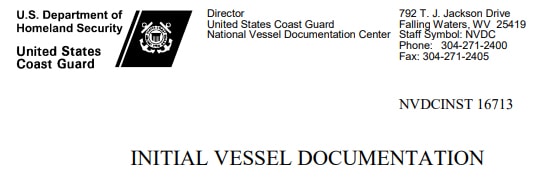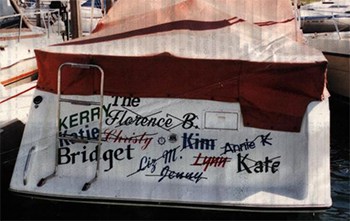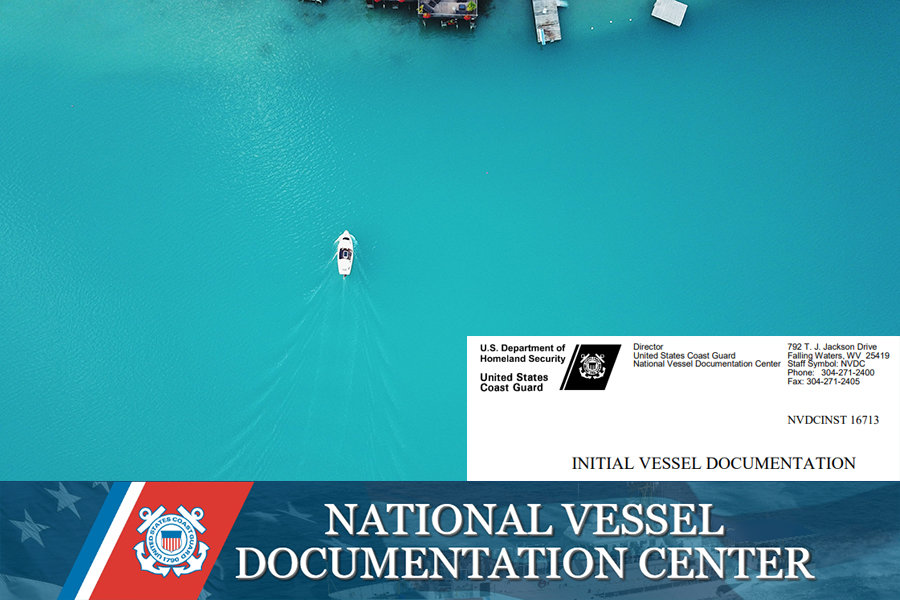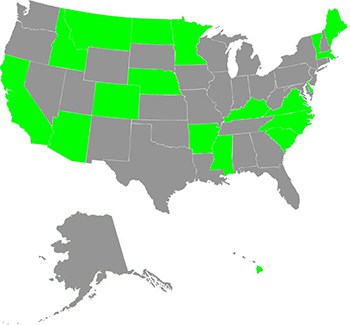Documenting a boat with the USCG Is generally the choice for larger boats that are primarily used in large bodies of water. Titling a boat through your state is generally the choice for boats being used primarily on inland lakes.
A boat can be documented through the United States Coast Guard National Vessel Documentation Center. Titling a boat with a state requires the boat to be titled again only if you move out of state, or when the boat is sold. The initial documentation fee for a recreational vessel of 5 net tons or more is $100 and $26 annually.
5 net tons is mainly a measurement of volume and consists of most boats over 25 feet long. Once a boat is documented, you may still be required to register your boat in the sate of primary use, but not all states require this.
Benefits Of Documenting A Boat
 The main benefit of documenting a boat with the USCG NVDC (United States Coast Guard National Vessel Documentation Center) is for boats that travel into international waters. A federally documented boat that enters foreign waters, carries some protections as being under the United States Flag.
The main benefit of documenting a boat with the USCG NVDC (United States Coast Guard National Vessel Documentation Center) is for boats that travel into international waters. A federally documented boat that enters foreign waters, carries some protections as being under the United States Flag.
This document by the federal government also aids in gaining clearance into that country also.
All commercial vessels of 5 net tons or more must be documented and carry specific extensions to there use. This grants them use for things like fishing, dredging, etc. Also, a federally documented vessel does does not carry a state title.
Insuring a documented vessel generally provides for better insurance rates. Check with your insurance agent.
You may have the availability of preferred mortgages on documented vessels. If your boat is financed and U.S. Coast Guard documented, a Preferred Ships Mortgage will be recorded and filed with the U.S. Coast Guard.
Not only is it easier to get a loan on a documented boat, but The bank is recording a “First Preferred Ships Mortgage”. This allows for the tracking of liens, mortgages, satisfaction of liens. When you’ve paid off the mortgage on your boat. The lender will supply the National Vessel Documentation Center a document showing a Satisfaction of Mortgage.
This assures any potential boat owner, that they are purchasing a boat free an
d clear of any encumbrances. So it is a bit like recording a mortgage against a house.
Documenting Through The United States Coast Guard National Vessel Documentation Center
To obtain official forms, visit the USCG NVDC website or contact NVDC at (800) 799-8362 or (304) 271-2400. Application packages and documents eligible for filing (in .pdf format) can be e-mailed to nvdc.pdf.filing@uscg.mil or faxed to (304) 271-2405.

Keep in mind that there are various businesses that claim to be able to facilitate your application process. However, the NVDC does not recommend anyone use them. They do not represent the USCG NVDC. Use the contact information above to deal direct with them.
The U.S. Coast Guard’s National Vessel Documentation Center (NVDC), located in Falling Waters, West Virginia, is the only entity authorized to issue Certificates of Documentation (CODs).
Is Documenting Your Boat Enough
Just because you documented your boat with the US Coast Guard, doesn’t mean that you won’t have to also register your boat in the state. Though there are states that may not require you to register a documented boat.
Here are the states in which don’t require you to register your boat if you have had it documented with the federal government through the United States Coast Guard:
- Arkansas
- Arizona
- California
 Colorado
Colorado- Delaware
- Hawaii
- Idaho
- Kentucky
- Massachusetts
- Maine
- Minnesota
- Mississippi
- Montana
- North Carolina
- North Dakota
- Nebraska
- South Carolina
- Virginia
- Vermont
As with any written article, I suggest you check with the overriding authority to verify that nothing has changed and the information is still valid. As any article ages, laws can change.
Since there are 19 states that allow you to get away without state registration if documented, the other 31 states DO require you to also register your boat with the state of primary use.
Registering with the state may require you to, in essence, be double registered.
When you document your boat with the USCG, you have to place your identifying information on your boat similar to registering with the state. When documented, you have to place the name of your boat and the hailing port (A “hailing port” typically is the home port of the vessel owner, although a hailing port can be any city and state in the U.S.) on the transom.
You also have to permanently affix your certificate number somewhere inside the boat that is easily accessible. So if you are also required to register with the state of primary use, you will also have to display the registration markings as required by the state.
Title Or Document Your Boat
While documenting a boat may provide a discount on insurance and taxes, if you are not going to travel into international or foreign waters, there may not be much of a benefit to doing it. Since a documented boat has to be named, when you go to sell it the next owner may not like the boat’s name.

Changing the boat’s name has to to be approved by the U.S. Coast Guard’s National Vessel Documentation Center and there is a fee to doing this. The other issue is that there is a widespread maritime phobia to changing a boat’s name. Many feel that this is “bad luck”.
There are ceremonies performed when changing a boat’s name in hopes of appeasing the God’s. Legend says that when a boat is christened with a name, its name goes into a “Ledger of the Deep” maintained by Neptune (or Poseidon) himself.
While I personally don’t fall victim to this way of thinking, MANY actually do. So when it comes time to sell/upgrade your documented boat, you would have been prudent to name your boat with a likable name.
As odd as this may be, documented boats can have the same name as other documented boats. They can also be labeled with any U.S hailing port whether you use it there or not.
I have had boats that qualify for USCG documenting, but I have chosen to stick to state titling. I feel that most family and watersport enthusiasts within the realm of the boating style I enjoy, are more comfortable and identify with a state titled boat.
You can check here to see if your state requires title on boats.
 By the way, if you want to display a name for my boat, you can do so even if your boat is titled and registered with the state. In fact, you can rename it as much as you like. I only did this with my first boat back in the 80’s, and only because my brother who owned half of it, insisted.
By the way, if you want to display a name for my boat, you can do so even if your boat is titled and registered with the state. In fact, you can rename it as much as you like. I only did this with my first boat back in the 80’s, and only because my brother who owned half of it, insisted.
While I occasionally boat on the Great Lakes, I more enjoy the inland lakes. If I was coastal and boating in the ocean, I would probably document my boat.
One more thing to keep in mind is, even though you document your boat and are issued a certificate number, your boat’s HIN must stay in tact. The boat’s Hull Identification Number must remain unaltered whether your boat is documented or titled. You can understand more about your boat’s HIN here, including how to understand what it means.


 Colorado
Colorado